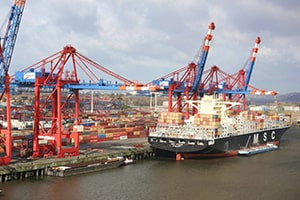When entering the field of international trade, it is vital to understand the theories and concepts that make up this vast market. Failing to do so can be detrimental to your career when starting in a position that handles trading on a global scale. But what concepts of this sector should a professional focus on? Begin your studies by exploring globalisation, the process by which regional economies, societies and cultures have become integrated through a global network of communication, transportation and trade. You will discover that privatisation is defined as ‘a transfer of ownership and management of an enterprise from the public sector to the private sector’. You will be introduced to the concept of ‘mercantilism’, which is a trade theory holding that a country’s wealth is measured by its holding of treasure, which usually means its gold. How much say does a countries’ government have in trade with other countries? In this course, you will explore ‘free trade’, a state of affairs where the government does not attempt to determine what its citizens can obtain from another country or what they can produce and sell to another country.
The course continues by introducing you to the classifications of barriers to internationalisation and the advantages of globalisation. The ‘law of comparative advantage’ will then be discussed, which refers to the ability of a country to produce a particular good or service at a lower opportunity cost than another party. You will explore the fact that a country that practices neomercantilism attempts to run an export surplus to achieve a social or political objective. You will learn that Adam Smith argued that a country has an absolute advantage in the production of a product when it is more efficient than another country in producing that product. According to David Ricardo’s ‘Theory of Comparative Advantage’, it makes sense for a country to concentrate on the production of those products that it produces most effectively and import the goods that it produces less efficiently. This is done even if this means buying goods from other countries that it could have produced more efficiently itself. You will discover that the theory of comparative advantage suggests that trade is a positive-sum game in which all countries that participate in it realise economic gains.
Next, you will learn that the ‘international product life cycle’ theory of trade states that the location of the production site for certain kinds of products shifts as they go through their life cycles, which consists of four stages. You will gain insight into the Heckscher-Ohlin Theory and the predictions of countries’ economic behaviour that this theory suggests. You will then understand that the ‘foreign trade multiplier’ is based on the assumption that exports and investments are independent of changes in the national income level. However, in reality this is not the case. A rise in exports does not always lead to an increase in national income. You will be taught that a ‘commercial policy’ is an umbrella term that describes the regulations and policies that dictate how companies and individuals in one country conduct commerce with companies and individuals in another country. Finally, you will study the ‘mercantilism trade’ theory, tariffs, factor mobility and the ‘multiplier effect’. This course will be of interest to business students or professionals in international trade. Why wait? Start this course today and become an expert in international trade.
What You Will Learn In This Free Course
View All Learning Outcomes View Less All Alison courses are free to enrol, study, and complete. To successfully complete this Certificate course and become an Alison Graduate, you need to achieve 80% or higher in each course assessment.
Once you have completed this Certificate course, you have the option to acquire an official Certificate, which is a great way to share your achievement with the world.
Your Alison certificate is:
- Ideal for sharing with potential employers.
- Great for your CV, professional social media profiles, and job applications.
- An indication of your commitment to continuously learn, upskill, and achieve high results.
- An incentive for you to continue empowering yourself through lifelong learning.
Alison offers 2 types of Certificate for completed Certificate courses:
- Digital Certificate: a downloadable Certificate in PDF format immediately available to you when you complete your purchase.
- Physical Certificate: a physical version of your officially branded and security-marked Certificate
All Certificate are available to purchase through the Alison Shop. For more information on purchasing Alison Certificate, please visit our FAQs. If you decide not to purchase your Alison Certificate, you can still demonstrate your achievement by sharing your Learner Record or Learner Achievement Verification, both of which are accessible from your Account Settings.












 Avg. Hours
Avg. Hours  Contains Video
Contains Video  CPD Accredited
CPD Accredited 
 Total XP:
Total XP: 
 Knowledge & Skills You Will Learn
Knowledge & Skills You Will Learn 








